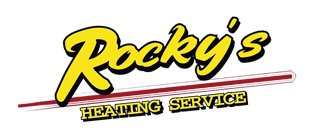Rocky’s Heating Service is committed to keeping our customers warm and safe while saving them money on energy bills. Rocky’s heating system service tips can help you inspect and maintain your mechanical systems and appliances in top operating condition. Rocky’s Tips can help you identify maintenance tasks you can perform your self, and recognize reasons to call a technician. Regular maintenance and tune ups can prevent small problems from becoming big ones. Continue reading for our detailed heating system maintenance and service tips…
All Forced Air Systems:
- Conventional filters on forced-air systems should be checked monthly and cleaned or replaced as needed.
- Electronic filters should be checked monthly and cleaned as needed.
- Care should be taken to ensure the interior components are installed in the correct orientation after cleaning.
- Noisy blower sections should be brought to the attention of a technician.
- All types of furnaces and boilers should be inspected by a qualified technician every year to ensure that all the components are operating properly and no connections are loose or burned.
Gas Furnaces and Boilers:
- If gas odors can be detected, call the gas company immediately.
- Do not turn on any electrical equipment or use anything with an open flame.
- Gas furnaces and boilers should be cleaned and serviced annually.
- The exhaust pipe should be checked for loose or corroded sections.
- The heat shield (located where the burner enters the heat exchanger) should be checked to ensure that it is not loose or corroded.
- Burn marks around the heat shield or soot on the front may indicate a draft or combustion problem. A technician should be contacted.
All Hot Water Systems:
- Radiators and convectors should be inspected annually for leakage (particularly at the valves).
- Radiators should be bled of air as necessary during the heating season.
- Circulating pumps with oilers should be lubricated once during the heating season.
Electric Heat:
- Electric furnaces and boilers should be inspected by a qualified technician every year to ensure that all the components are operating properly and no connections are loose or burned.
- The fuses or circuit breakers in some electric systems can be checked by the homeowner.
- Electric baseboard heaters should be inspected to ensure an adequate clearance from combustibles and they are kept clean.
- Baseboard heaters which have been mechanically dam-aged should be repaired or replaced.
Oil Furnaces and Boilers:
- Oil systems should be checked by a qualified technician on an annual basis.
- Oily soot deposits at registers of forced-air systems may indicate a cracked heat exchanger. A technician should be contacted.
- The exhaust pipe from the furnace or boiler should be checked for loose connections or corroded sections.
- The barometric damper on the exhaust pipe should rotate freely.
- The chimney clean out should be cleared of any debris.
- Soot on the front of the furnace or boiler may indicate a draft or combustion problem. A technician should be contacted.
Wood Stoves:
- Wood stove chimneys and flues should be checked for creosote build-up and cleaned at least annually (more frequently depending upon use).
- Clearance to combustibles around wood stoves should be maintained at all times.
- If there is any doubt about the safety of a wood stove, contact the city building inspector immediately.
Heating Ducts:
- Have your ducts cleaned at least every 5 to 6 years, this keeps your furnace clean and will increase life expectancy.
- Make sure your ducts have no cracks or leaks in the ductwork and tape where needed.
Water Heater:
- Drain tank at least every year and flush it out.
- Hook a garden hose up to the bottom drain valve. Place the garden hose in a position to allow full discharge of the water through the hose (in the yard or flower bed or the bath tub).
- Open the drain valve wide open. DO NOT CLOSE OFF THE
INCOMING COLD WATER SUPPLY TO THE HEATER. - Run the water out of the hose until the water runs clear.
- Once the water is clear, shut off the bottom drain valve and remove the
garden hose. - Remove the elements and soak in vinegar, then scrape off scales.
Electrical System:
- To prevent power outages, be sure there are not too many appliances plugged into one circuit.

